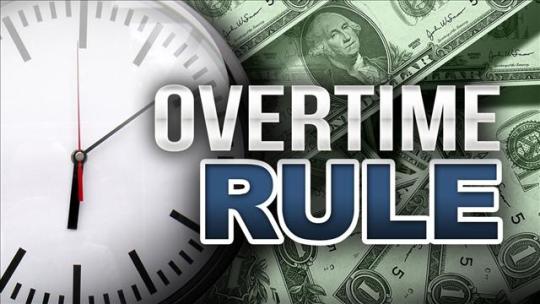National Retail Federation and others want overtime rule deemed
unlawful
The U.S. Chamber of
Commerce and more than 50 other business groups have asked a judge to make a
speedy decision in their case to block the federal overtime rule (Plano
Chamber of Commerce v. Perez, E.D. Tex., No. 4:16-cv-732).

Photo Source: austinhr.com/
The business groups
argued that the Department of Labor (DOL) exceeded its authority when it more
than doubled the salary threshold for exempt employees and when it included an
“escalator” provision in the rule that will automatically raise the
threshold every three years.
They have asked Judge Amos Mazzant of the U.S. District Court for the Eastern
District of Texas to expedite court proceedings and deem the rule unlawful.
They argued that a decision can be made on the administrative record as a
matter of law rather than through a trial.
“Simply put, they are saying that the Department of Labor did
something it had no authority to do and that it doesn’t require a long and
protracted lawsuit to decide the matter,” said Michael Abcarian, an
attorney with Fisher Phillips in Dallas.
“The
business-interest plaintiffs made some strong arguments about issues that may
not have been at first considered by the Department of Labor,” he said.
However, “until we see what the government says in response, it’s hard to
say how the court will decide.”
The rule is
scheduled to take effect Dec. 1, so there may not be enough time for the court
to reach a decision on the matter before employers have to comply.
“While this
particular court is well-known for its speedy calendar, employers would
be very wise to proceed on the assumption that the new regulations
will become effective on Dec. 1,” Doran said.
The motion raised
some arguments that may “hold some water,” said Maria Greco Danaher,
an attorney with Ogletree Deakins in Pittsburgh. But she noted that it’s
already near the end of October, and it will take the DOL some time to respond
to a motion of this nature.
“While this
particular court is well-known for its speedy calendar, employers would
be very wise to proceed on the assumption that the new regulations
will become effective on Dec. 1,” said John Doran, an attorney with
Sherman & Howard in Phoenix.
DOL’s Authority
Challenged
The overtime rule will raise the exempt salary threshold
under the Fair Labor Standards Act (FLSA) from $23,660 to $47,476. The rule
also provides for automatic increases every three years based on the 40th
percentile of weekly earnings of full-time salaried workers in the lowest-wage
Census region.
In their Oct. 14
motion seeking an expedited judgment in the case, the business groups said the
changes “fundamentally alter the focus of the exemption analysis.”
The rule
“would effectively deny the overtime exemption for entire categories of
salaried executive, administrative, professional and computer employees whose
job duties qualify them to be treated as exempt, and is inconsistent with the
statute as well as more than 75 years of congressionally accepted regulation by
the department,” the motion said.
The business groups
argued that the change to the salary threshold and the automatic indexing
provision exceeded the DOL’s authority under the FLSA. They also argued that
the department exceeded its rulemaking authority under the Administrative
Procedure Act.
“This isn’t a
fly-by-night lawsuit that’s aimed at getting a little press attention,” Abcarian
said. He believes it is a solid, well-thought-out lawsuit about the scope of
the government’s authority, and it may have implications for future challenges.
States Also Sued
Texas and 20 other
states have also filed a lawsuit seeking to halt the rule. They asked the same judge to temporarily stop the rule from going into effect so they
will have the time to proceed in court with their claims.
Danaher noted that
on Oct. 17, the business groups asked the court to consolidate the two cases.
“My guess is
that they will be consolidated,” she said. Although their arguments are
slightly different, they are essentially asking for the same result.
For now, she said,
employers should keep preparing for the Dec. 1 effective date.
“While certain
challenges to the regulations have the potential to succeed, hoping for a ‘hail
Mary’ touchdown before Dec. 1 is ill-advised," Doran said.
Article Source: http://bit.ly/2ekZmOt

Key Takeaways
1. The business groups argued that the DOL
surpassed its authority with the overtime rule.
2. Employers should assume the new regulations will
become effective on December 1.
3. The court will most likely consolidate the
states filed lawsuit with the business groups filed lawsuit.
Let Converge HR Solutions assist your organization with
regulatory compliance issues like this one. We will provide EEO, OSHA and DOL
updates, compliance auditing, compliance reporting and more to ensure your
organization is compliant to avoid any and all consequences. Contact us for more information at 610-296-8550 or
info@convergehrsolutions.com
Follow Converge HR Solutions on Facebook and Twitter to
keep up with our cutting edge -company! Visit www.convergehrsolutions.com to
learn more about how we can help your business.


0 Comments